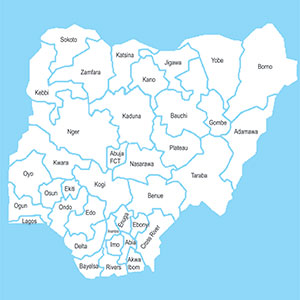36 states should be scrapped- Promoter of regionalism
The 36 states of the federation should be scrapped and Nigeria be returned to regional system, an activist, Dr Akin Fapohunda, has proposed. In a private framework he developed for speedy restructuring of Nigeria’s governance structure, Dr Fapohunda also suggested the scrapping of the presidential system of government, reintroduction of the parliamentary system, return to […]

The 36 states of the federation should be scrapped and Nigeria be returned to regional system, an activist, Dr Akin Fapohunda, has proposed.
In a private framework he developed for speedy restructuring of Nigeria’s governance structure, Dr Fapohunda also suggested the scrapping of the presidential system of government, reintroduction of the parliamentary system, return to unicameral legislature, as well as provision for self-determination by any section of the country which desires so.
Speaking to Daily Trust last night, the promoter said Nigeria needs a new governance framework, insisting that the current structure is not working, and that if sustained for a much longer period could even lead to the complete failure of the country.
Dr Fapohunda was shedding light on the content of a trending document he authored, in which he proposed the new governance structure.
- S/Africa’s ANC heads for coalition after 90% votes’ count
- Nigerians groan as staple foods soar beyond reach
He said it is a memoranda to all Nigerians, which could eventually transmute into a parliamentary bill or even trigger a sort of national discourse in the form of a confab of leaders of thought from across all sections of Nigeria.
As a patriotic Nigerian, he said he wanted to elicit serious conversation and positive discussions on how to resolve Nigeria’s existential challenges, insisting that the 1999 Constitution has failed in addressing multiple problems bedevilling Nigeria.
Tagged, ‘A Bill for an Act to Substitute the Annexure to Decree 24 of 1999 with a New Governance Model for the Federal Republic of Nigeria’, he proposes that Nigeria should return to regional government structure that would be led by a prime minister and his/her cabinet, while allowing individual ethnic groups to aggregate or disaggregate as provinces, divisions and districts while being in control of their affairs.
“This Act may be cited as the Constitution of the Federal Republic of Nigeria New Governance Model for Nigeria Act 2024,” he said.
According to him, “All Nigerians must look into this proposal this year. It should be ahead of the 2027 election frenzy. I am not saying that all the things I proposed must be implemented immediately. What I am saying is that we should start from somewhere by examining and adopting those elements that could work,” he said during the telephone interview.
In the said document, he said: “The President of the Nigeria Federation is the head of the nation-state. The prime minister acting through the National Assembly shall nominate the candidate for President. The nominee shall be elected president if the National Assembly approves his candidacy by a two-third-majority vote of all elected members.
“The term of office of the President shall be six years. No person shall be elected President for more than two terms.
“Constituent units of regional territories shall control and retain all resources and revenues falling within its natural jurisdiction but shall only pay both federal and regional taxes according to laws.
“For the avoidance of doubt, the entire property in and control of all minerals, mineral oils and natural gas in, under or upon any land in Nigeria or in, under or upon the territorial waters of Nigeria shall vest in the government of the regional territory and the constituent units,” he said.
Meanwhile, the House of Representatives has disowned the bill.
In an interview with the Punch, House spokesman, Akin Rotimi, said, “The Committees on Rules and Business and Constitution Review have confirmed that there is no such bill before them.”
Similarly, the Chairman, House Committee on Rules and Business, Francis Waive, said that the said bill is not before the committee.
He said, “There are two routes to making presentations for constitutional amendments. One is by members proposing an amendment bill during the plenary. The second is by memoranda from individuals and groups to the Constitution Review Committee
“Please, note that memoranda submitted should eventually come by way of bills sponsored by a member of the committee.
“On this specific memo (draft bill) under reference, I doubt if it has come before the Rules and Business Committee for listing. I speak as chairman of the committee”, he said.
